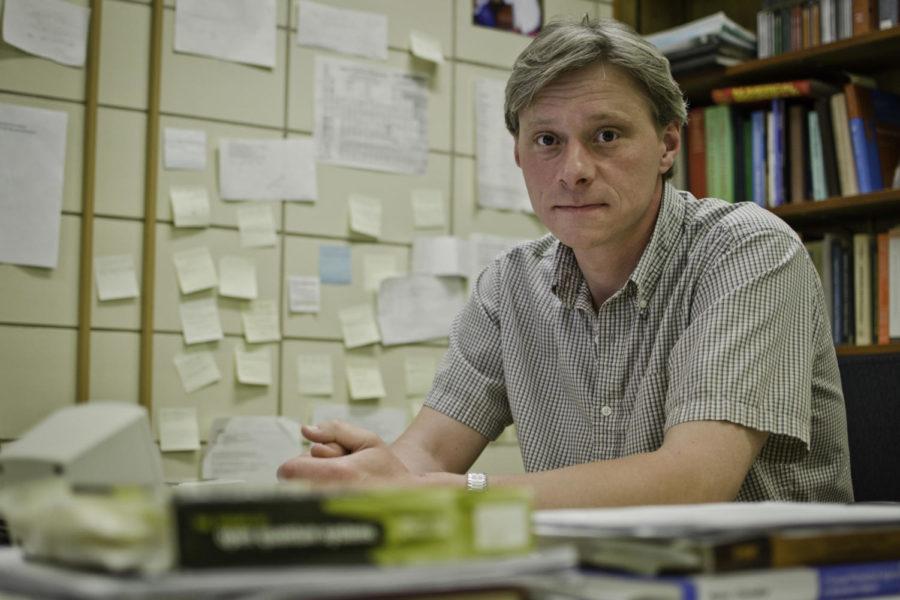Birth of next modern computer hatches with quantum computing
Photo: David Derong/Iowa State Daily
Viatches Dobrovitski, a scientist at U.S. Department of Energy Ames Laboratory, has been working on theoretical platforms to bring quantum computing to life. Quantum computers are different from regular computers in that the very basic unit of the computers are different. Regular computers read binary, which are sets of zeros and ones, while quantum computers read the spin of an electron.
May 30, 2012
Iowa State is not shy about its claim to fame with the invention of the modern computer by John Atanasoff and Clifford Berry. With the work performed by Viatcheslav Dobrovitski, a scientist at the U.S. Department of Energy’s Ames Laboratory, the university may have something else to brag about.
The birth of the next modern computer did not hatch through experiments or accidents but in the mind of Dobrovitski. Dobrovitski is a theoretical physicist, which means he thinks about what could be, and experimental physicists try out his ideas to see if the idea is correct or needs to be thought over again.
“So as you know there are problems which are easy to solve, problems which are difficult to solve, and problems which are kind of in the gray area,” Dobrovitski said. “Quantum computing mostly deals with problems which are in this gray area. Where nobody knows whether they are hard or easy. They are believed to be hard. Some people claim they are easy, but nobody knows how to solve them efficiently on a classical computer, but we can solve them efficiently on a quantum computer.”
Quantum computers are different from regular computers in that the very basic unit of the computers are different. Regular computers read binary, which are sets of zeros and ones, while quantum computers read the spin of an electron.
The word “quantum” itself means nothing more than on the atomic level scale, so think of electrons and protons. The basic quantum computer unit is a qubit (short for “quantum bit”) and is the way an electron spins. The spin of an electron is like the spin of a beach ball, except when the electron spins counterclockwise, it stores different information from an electron spinning clockwise.
A large challenge of quantum computing is that outside sources want to interfere with the spinning ball, and once the spin of a ball is lost, the information is also lost. Dobrovitski is working on a way for the electron spin, or qubit, to store information uninterfered and for the information stored in a qubit to last longer.
“[The qubit] will lose its information because it interacts with the environment out here, and the interaction with the environment makes [the information] decay away,” said Bruce Harmon, the deputy director of the U.S. Department of Energy’s Ames Laboratory and Distinguished Professor of Physics at Iowa State. “It’s something that people in the quantum community have concerned with for some time.”
Dobrovitski said some of the current complications with the quantum computer.
“The main problem with the quantum computer is that it’s not built,” Dobrovitski said. “So this is essentially what I am doing, trying to find ways to develop platforms or rather, pieces which will hopefully be assembled one day into quantum computing.”
Dobrovitski, if he is ever named the father of the next modern computer, will more than likely share his title with an assortment of physicists, engineers and mathematicians. Helping the qubit store more information longer is just one step on the path to creating the first quantum computer.
“We took an idea and restructured it in a different situation. It is a very tricky process because the whole idea is to do things very well, to protect this system very well,” Dobrovitski said. “Protecting the spin is not enough because we can insulate it but we cannot do anything good with it.”
What quantum qubits can do collectively is a big challenge, and the next big thing for Dobrovitski, who said the computational power of quantum computers is unlike anything ever seen before. What may take a regular computer 500,000 search entries to find, the quantum computer only needs 1,000 entries to find the same thing.
However, understanding how quantum computing works will not only help the field of physics, but can be applied to assist other fields in making measures at a small level. A long term application of quantum computing would be to increase computing security, since more computing power could mean more difficult codes for hackers to crack.
“In many cases, by using these ideas of quantum computation we can come up with better technologies which are more sensitive and are more efficient in measuring small quantities,” Dobrovitski said. “I am not aware of anyone inventing this before.”

















